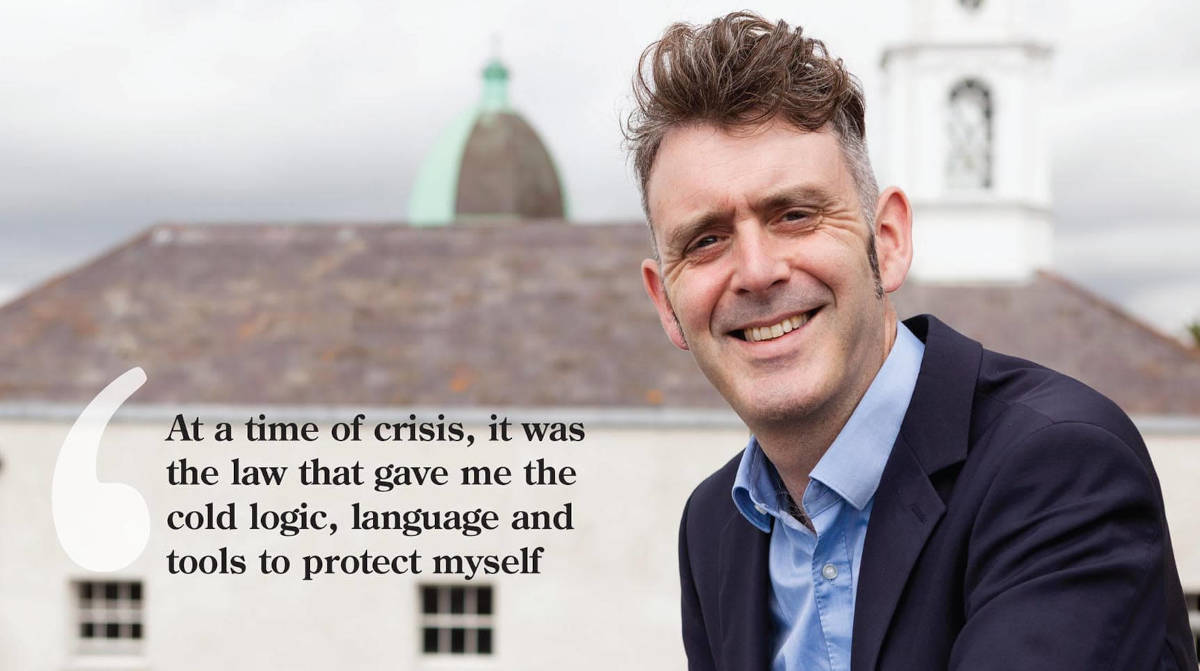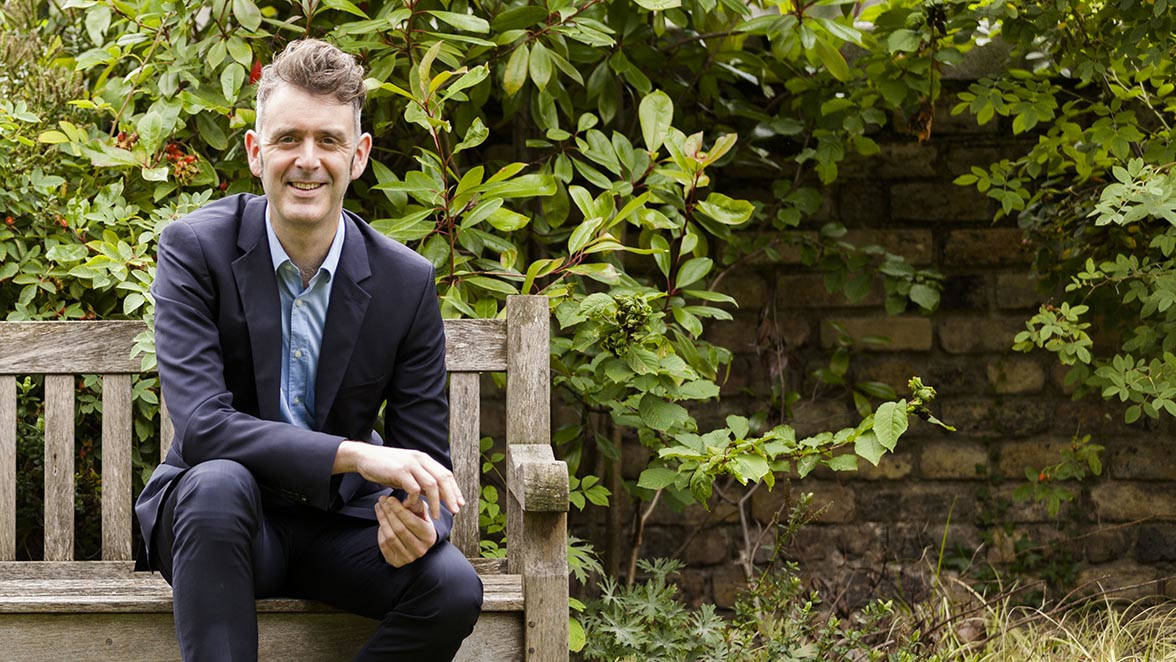 Rory O’Boyle
PIC: Cian Redmond
Rory O’Boyle
PIC: Cian Redmond
In from the cold
I work in the education sector and recently attended a Law Society PPC lecture on the ‘Shrink Me’ module, where I listened to three inspiring, newly qualified solicitors talk to a group of trainees about their experiences of being gay and fitting in.
They were so eloquent about their struggles and successes in finding their place in the world. The profession is stronger for having them – not as ‘shadows’, but as fully formed individuals.
I struggled as I listened. Sitting with a colleague, I had to turn away as memories of my own time as a trainee resurfaced. I went back to my office and dug out a letter I had written many years previously. The background to that letter is that, at 26, I tested HIV positive (HIV+).
I was beginning my career and starting out as a trainee solicitor. That was in 2001. But I still remember everything about the day – from the clothes I was wearing, to my arrival at the clinic in St James’ Hospital that morning.
Positive test
The doctor initially went through a list of minor ailments, all of which were negative. She then paused before saying that she was very sorry but that my HIV test had come back positive.
In response to my suggestion about sending my bloods to another lab for further review, she replied that the test had been perfected and errors no longer occurred.
Eventually, I was directed down the corridor to a social worker. He took out a bright yellow hospital appointment card and wrote my name, hospital number, ‘HIV +’.
That moment remains even more vivid than the initial diagnosis. My immediate concern was what to tell people.
Not properly ‘out’
I wasn’t even properly ‘out’ as gay in any meaningful sense. The social worker assured me that revealing my status wasn’t necessary – not yet anyway.
Also, the diagnosis was no longer the death sentence it had once been, as the anti-retroviral drugs were proving very effective and were prolonging life. I was given a number of additional tests, including for pneumonia and tuberculosis.
That diagnosis in 2001 came two months before I was due to start my training contract with one of Dublin’s corporate law firms. I asked my medical consultant whether I should proceed with the training – she unreservedly advised that I should.
Night sweats
Starting in spring 2001, I did four months of in-office training prior to my PPC1. I remember sitting in the firm’s reception area with the other new trainees on my first day in the office thinking that, for them, their careers were beginning, but for me it was coming to an end.
I would wake during the night suffering from night sweats – an early-stage aspect of the untreated virus.
I started in the Law School in September 2001. While there, the spare time gave me time to think about what had occurred. I slept for hours, only getting up in the afternoon, a mixture of viral fatigue and depression.
I started to miss large swathes of college.
When I did feel reasonably well, I would then drink with friends to ease my mind.
In limbo
In February 2001, I contacted the Law School to say that I would not be sitting the PPC1 exams in March. Next, I had to inform my firm. In order to return to the office, the expectation was that I would have sat and passed those exams. As the explanation for not sitting them, I advised the firm that I was unwell.
I was informed that the nature of the illness would have to be disclosed. In haste, I revealed my diagnosis. I was now in limbo, out of the Law School, and out of work until I passed the PPC1.
Group Analytic Practice
However, during that spring and summer of 2002, I started to inch towards something better. The initial viral fatigue was passing. I moved into shared accommodation with a friend and we would go jogging together.
I swam in the sea in both Dublin and at home. I also got together with four other HIV+ men and established a therapy group facilitated by a practitioner in the Group Analytic Practice.

I got the opportunity to reflect on my own experience and had the privilege of hearing the stories of other men in similar circumstances. While I left many years ago, I am aware that the group is still running, with new participants joining and leaving over the years.
Certain conditions
Later that year, 2002, I sat the autumn sitting of the PPC1 examinations. I think that I performed better in those examinations than any previous law assessments I had undertaken.
I was now able to return to the office. Because of my previously disclosed status, the firm sought to impose certain conditions.
I had been advised that the managing partner would have to be informed of my situation, and a meeting was scheduled for June 2002. The managing partner advised further that, because of the risk of infection, the firm’s executive committee would have to be consulted in advance of my return to the office.
I was also told that the list of people my status would potentially be disclosed to would include any trainee that I shared an office with, the head of any department for whom I worked, and all staff with first-aid responsibilities. It seemed that my return to the office was contingent on my diagnosis being revealed to a large and growing number of people.
The letter
I prepared a letter to the firm in December 2002, focusing on the conditions governing my return to the office. My first task was to establish exactly who my diagnosis would be disclosed to.
To clarify matters, I wrote: “It is still unclear to me what specific conditions the firm seeks to impose on my return to the office. In this regards, I respectfully request that you clarify the following in writing:
- What was the decision of the executive committee? Was my return to the office approved, subject to the provision that my HIV+ status be revealed to first-aid personnel?
- Is it proposed to tell the head(s) of unit(s) for whom I shall work and, if so, what are the firm’s reasons for doing so?
- Is it proposed to tell trainees with whom I share an office that I am HIV+, or is this condition no longer felt necessary?”
First-aid personnel
Like many HIV+ people at that time (and previously), as well as dealing with the diagnosis, I also had to provide some basic guidance and education about HIV to those in positions of authority. In relation to the first-aid issue, I informed them: “Best medical practice requires that the firm insists that first-aid personnel be trained in such manner that they adopt ‘universal precautions’.
This means that first-aid personnel must presume that each person they treat is HIV+ and, hence, act accordingly. By placing first-aid personnel in a position of prior knowledge in relation to a single member of staff, you are implying a presumption that other members of staff are not HIV+ and, hence, ultimately, exposing your first-aid personnel to a greater risk of infection.”
Dealing with the diagnosis
I had been previously advised that the firm would seek independent medical opinion when reaching its decisions. I separately had my consultant write to the firm, setting out basic medical information.
She also argued strongly that there were no reasonable grounds for disclosure, and discussed requirements under the Employment Equality Acts.
Emphasising the points made by my doctor, I stated: “Dr M is one of the leading medical experts in this area and her advice is very much consistent with expert medical opinion in her field of expertise. Her letter is clear and unambiguous.
"However, if you are in receipt of expert medical opinion contradicting Dr M’s advice, I request that you disclose such advice to me so that I may take it into consideration when deciding if my desire for medical confidentiality is unreasonable or ungrounded.”
Sane guy in the room
I felt my life was in chaos but, in an odd way, the firm was offering me an opportunity to be the ‘sane guy in the room’. After all, these events were taking place in 2002 – not 1982, or even 1992.
Although I didn’t feel it at the time, I purposely finished the letter on a positive note saying: “I am delighted to report that my overall well-being has greatly improved since last winter. It is over two months since I completed the PPC1 exams, and I am very anxious to resume my apprenticeship with the firm at the earliest possible date.
"I wish to act in a reasonable and thoughtful manner, addressing any concerns the firm may have. Ideally, I seek to return to work at the start of the new year.
Ultimately, I do not believe that my medical diagnosis shall adversely affect my ability to pursue a successful career in the legal profession.”

If I didn’t recognise myself in the letter from so many years ago, through the passage of time, other voices emerge. My father’s voice is there in the need to keep going, do your day’s work, and be part of the world. The tone I adopted from my mother was to be polite, while remaining stubbornly logical, even if (or perhaps especially if) the topic was emotive.
No shame
There was also a total absence of shame. And that is the aspect of the letter that I celebrated most when I reread it. Not that shame is unknown to me, but rather its absence in the letter reflected something about the law that perhaps first attracted me to study it in the first place.
At a time of crisis, it was the law that gave me the cold logic, language, and tools to protect myself.
Ultimately the firm did not seek to impose any conditions. I returned to the office and finished my traineeship. With the initial trauma over, I started to establish friendships with other trainees and solicitors in the firm.
I worked for a terrific partner and, on qualification, received a number of offers from different departments and ended up staying with the firm for a period.
Internal struggle
After a traumatic start, we all had found some balance. A self-perceived ‘outsider’, the gay teenager and the HIV+ young man was starting a long and complicated walk in from the cold. Recently, I bumped into the now managing partner and a number of heads of department from the firm.
I don’t know if they were specifically aware of my backstory. However, on meeting them again, I was struck by the genuine friendliness and warmth of their greeting, which was equally there in my response to them.
Acceptance and appreciation
Looking back, it was a painful time and one that, in ways, I don’t think I will ever fully escape from. However, in the intervening years, science and medicine have answered my darker concerns with regards to HIV.
While accepting the loss that it entailed, I can now also appreciate that HIV opened me up to myself and to others in ways that, otherwise, probably would not have happened, and helped provide a type of resilience that I might not otherwise have developed.
Without oversimplifying the story, in the end, the most vital struggle had not really been with ‘the law’, or, bizarrely, even with HIV. My biggest battle was internal.
THE SITUATION TODAY
For any young person diagnosed today, the meaning of that diagnosis is thankfully altered beyond recognition – the experiences I describe hopefully now belong to history. If you are treated and your viral load is suppressed beyond detection for six months, then the virus is not transmittable.
Furthermore, your expected lifespan is normal.
In the intervening years, I have witnessed a dramatic revolution in society’s attitude to the LGBT community.
On the evening of Friday 28 June, leaving the office, I was moved to see the Pride flag flying above the Law Society – a symbol of inclusion.
The next day, I marched in the Dublin Pride parade with OUTLaw, a new network formed with the aim of fostering the inclusion of LGBT+ individuals and allies across the Irish legal sector.
On that march, we were joined by President of the Law Society Patrick Dorgan and the director general Ken Murphy. I understood, for the second time that weekend, how important symbols of inclusion are.
As we walked down O’Connell Street and past the GPO, we were met on the viewing stand by An Taoiseach Leo Varadkar.
He was reviewing a parade that marked the 50th anniversary of the Stonewall Riots, seen as a pivotal moment in LGBT+ liberation. It is wonderful to acknowledge that things that seemed unimaginable until very recently can now almost be taken for granted.
Rory O’Boyle
Rory O’Boyle is a solicitor and course manager at the Law Society